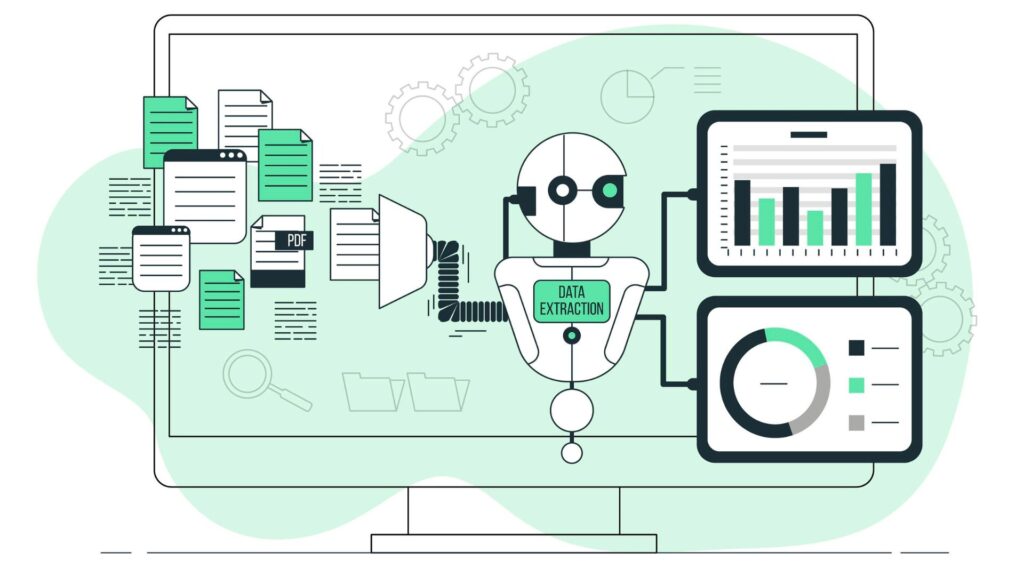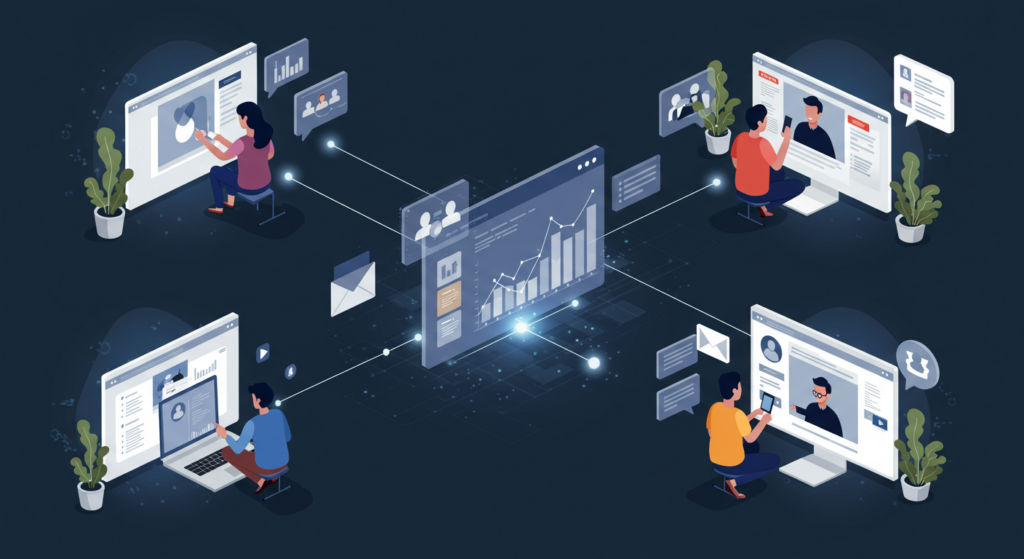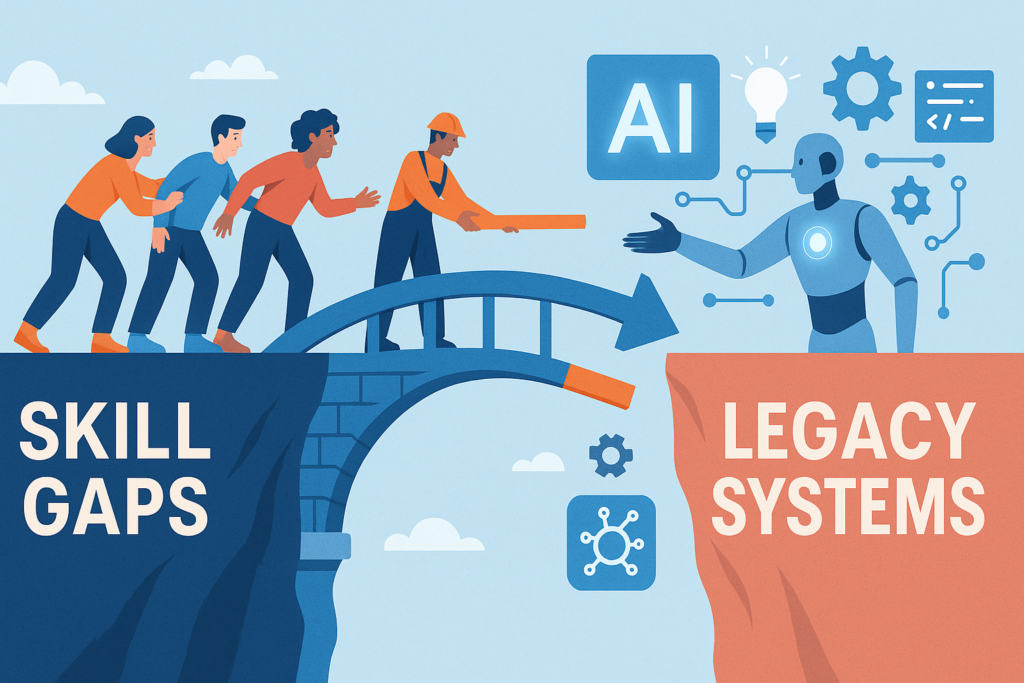The relationship between content marketing and artificial intelligence is operational. According to McKinsey’s 2024 State of AI report, 78% of marketing leaders now use AI in at least one area of their operations. From automating asset tagging to generating real-time customer insights, AI is reshaping how brands plan, create, and deliver content. The broader trend is that marketing success hinges less on output volume and more on delivering the right content to the right audience at the right moment. AI is uniquely suited to do so.
This convergence is enabling scale and precision that manual processes can’t match. Content teams can now move beyond reactive campaigns and build dynamic ecosystems where strategy is continuously optimized by behavioral data and performance insights. AI empowers marketers to make smarter decisions faster, whether that’s identifying a content gap, generating a new asset variation, or surfacing personalization opportunities in real time. As brands race to meet rising consumer expectations, integrating AI into content operations is becoming a necessity.
How Content Marketing and Artificial Intelligence Are Converging
The convergence of content marketing and artificial intelligence is driving a quiet revolution behind the scenes of the most successful digital strategies. What began as a tactical tool for automation has evolved into a critical enabler of intelligent content operations. AI helps shape content strategy in real time, fueling personalization, discoverability, and campaign performance.
As the role of AI matures, content marketing is shifting from a one-size-fits-all broadcast model to an adaptive, feedback-driven system. AI allows marketers to build smarter workflows, harness data at scale, and uncover opportunities human teams might miss. Rather than replacing creative professionals, this transition equips them with the right tools to create content that performs.
From Manual to Machine-Driven: The Rise of AI in Content Strategy
Until recently, content strategy relied heavily on intuition, brainstorming, and historical data. However, as content volumes explode and customer journeys become increasingly nonlinear, those methods fall short. AI offers a way to ingest vast amounts of data, from audience behavior to content engagement metrics, and deliver real-time recommendations on what to create next, who to target, and how to optimize messaging across touchpoints.
By integrating AI into the strategic layer of content marketing, teams can align output with measurable impact. Predictive insights reveal which content drives conversions and where gaps exist in the journey. The result is smarter prioritization, reduced rework, and campaigns that are informed by actual audience needs, not assumptions.
Breaking Silos: Connecting Creative, Data, and Technology in New Ways
Traditionally, creative teams, data analysts, and tech stakeholders have operated in separate lanes. But AI-powered content operations bring these disciplines into tighter alignment. Intelligent workflows connect content briefs with metadata, asset libraries with customer profiles, and performance analytics with content calendars in one centralized ecosystem.
Integration is especially powerful for organizations juggling multiple channels, campaigns, and compliance requirements. Instead of relying on fragmented tools or guesswork, marketers can build scalable systems where data flows seamlessly across planning, creation, and execution. The payoff? Less friction, more agility, and content that’s well crafted, timed, and placed.
Automating the Content Lifecycle with Intelligence
The modern content lifecycle spans more than just ideation and publishing. It also includes planning, versioning, compliance, distribution, and performance measurement. As demands grow more complex, artificial intelligence is stepping in to automate the repetitive, time-consuming tasks that bog down marketing teams.
By 2026, 80% of large enterprises will rely on AI-driven operations to manage digital content creation and delivery. Here’s the growing imperative: if your content processes aren’t intelligent, they’ll soon be obsolete. AI enables marketers to reimagine workflows, turning them from rigid pipelines into dynamic ecosystems that respond to market signals in real time.

AI-Powered Planning and Briefing: Eliminating Guesswork
Content bottlenecks often begin at the planning stage. Without visibility into performance trends or asset utilization, teams risk producing redundant or ineffective content. AI transforms this phase by providing data-informed insights that help teams create better briefs, anticipate content needs, and prioritize high-impact work.
AI-assisted planning tools can suggest optimal content types, channels, and topics based on past engagement data and known audience behaviors. Instead of guessing what will work, marketers start with a foundation of predictive intelligence. Teams benefit from a faster, more confident creative process and fewer missed opportunities.
Intelligent Asset Management: More Than Just Storage
Legacy digital asset management systems functioned as glorified file cabinets. Today’s intelligent platforms do far more. AI-enhanced asset management surfaces relevant content in seconds, recommends tags automatically, detects duplicate files, and identifies brand or compliance risks before assets go live.
Automation radically boosts discoverability and reuse. Teams can locate high-performing assets faster, personalize them for specific audiences, and repurpose them without starting from scratch. It’s an innovative, sustainable way to scale content without scaling chaos.
Personalization at Scale: The Real Payoff of AI in Content Marketing
Personalization has long been the holy grail of content marketing, but achieving it at scale has proven elusive. AI changes the equation by enabling marketers to move beyond broad segmentation toward dynamic, data-informed decisions. Brands achieve more relevant experiences, higher conversion rates, stronger customer retention, and greater efficiency across the content supply chain.
According to research, 69% of consumers say they expect personalized experiences, yet only 50% feel like the content they receive is truly tailored to them. The disconnect lies in execution. AI helps close this gap by automating how content is selected, adapted, and served across every channel for every user.
Real-Time Decision-Making for Known and Unknown Audiences
Marketers can no longer rely solely on third-party data to personalize experiences. AI enables personalization based on behavior and context, allowing content platforms to adjust in real time, even for anonymous visitors. Instead of waiting for someone to fill out a form, the system reacts to their clicks, scrolls, and timing patterns to decide which content to serve next.
This adaptive approach turns every moment into a micro-opportunity. Whether a user is landing on a homepage, browsing a product page, or clicking through an email, AI helps ensure the content feels personally relevant, boosting engagement without overstepping privacy boundaries.
Using Behavioral Insights to Deliver What Customers Actually Want
Personalization is only effective when it’s grounded in meaningful insights. AI-driven content intelligence platforms go beyond surface-level metrics to understand how users engage with content across touchpoints. They identify which content types, topics, and formats lead to action and which fall flat.
Armed with these insights, marketers can fine-tune their messaging, format, and timing to meet customer expectations. More importantly, they can automate these optimizations at scale. Instead of chasing one-size-fits-all personas, AI helps marketers deliver content that adapts to behavior, not assumptions, leading to higher performance with fewer wasted resources.

From Data to Strategy: Unlocking Insights with Content Intelligence
Content marketing can no longer afford to operate in the dark. As budgets tighten and expectations rise, the ability to measure and act on content performance is a competitive necessity. Combining content marketing and artificial intelligence helps marketers make informed decisions by revealing not just how content performs but why it succeeds or fails.
By analyzing everything from content views and click-throughs to audience behaviors and conversion paths, AI surfaces patterns humans might miss. These insights feed directly into planning and execution, helping teams optimize their entire content ecosystem. It’s a shift from reactive measurement to proactive strategy.
Identifying Gaps, Optimizing Assets, and Measuring ROI
Too often, marketers produce content without knowing what’s missing or what’s already working. AI changes that. By continuously analyzing performance data, intelligent platforms flag underperforming assets, recommend reuse of top performers, and identify content gaps based on behavioral trends and audience expectations.
This capability supports better decisions and prevents waste. Marketers can stop producing redundant or ineffective assets and start allocating resources toward high-impact opportunities. Over time, organizations see improved campaign ROI, streamlined production workflows, and a more resilient content strategy.
Turning Engagement Data Into Strategic Action Plans
Data alone isn’t valuable unless it leads to action. AI-driven systems turn raw engagement metrics into clear, prescriptive recommendations. Which segments are under-engaged? What formats are converting best? Where in the journey are users dropping off? These are the kinds of questions modern platforms can answer automatically.
Marketers can use these insights to inform everything from editorial calendars to creative briefs. Content becomes more relevant, timing becomes more precise, and marketing operations grow more agile. Your strategy becomes grounded in evidence and constantly evolving to meet real-world demands.
The Role of AI in Ensuring Brand Safety and Compliance
As content velocity increases, so does the risk of brand inconsistencies, regulatory missteps, and asset misuse. In industries with strict compliance requirements, such as finance, healthcare, or government, one oversight can lead to reputational damage or legal exposure. Artificial intelligence now reduces that risk without slowing teams down.
Rather than relying on manual review processes that are prone to bottlenecks and human error, AI enables real-time detection of compliance violations, off-message assets, and expired content. It empowers marketers to move fast while maintaining the guardrails that protect brand integrity and legal alignment.
Automating Risk Detection Without Sacrificing Speed
Manual compliance checks are time-consuming and often inconsistent. AI-powered tools automatically scan assets for potential risks, flagging content that includes unauthorized logos, outdated claims, or missing disclosures. These systems apply pre-set brand and regulatory criteria to each file, tagging issues and instantly triggering review workflows.
Automation accelerates time-to-market by removing delays in the review cycle. It also improves accuracy, ensuring nothing slips through the cracks. Marketers can confidently produce and publish content, knowing that risk mitigation is built into the process, not tacked on at the end.
Maintaining Governance While Enabling Creative Flexibility
One of the biggest tensions in content operations is balancing governance with creativity. AI allows both to thrive. Through intelligent tagging, automated audit trails, and AI-stamped content tracking, organizations can maintain full transparency and accountability without adding friction to creative workflows.
Teams can experiment with new content formats, generate asset variations, and iterate at scale while staying compliant with internal standards and external regulations. Brands can build an environment where innovation is encouraged but never at the expense of brand safety or operational oversight.
Overcoming Common Challenges When Implementing AI in Content Marketing
While the promise of AI in content marketing is undeniable, implementation isn’t always seamless. Many organizations struggle with legacy processes, disconnected tech stacks, or internal resistance to change. Others lack the data maturity or internal expertise needed to effectively deploy AI. But these challenges aren’t roadblocks; they’re signals that it’s time to rethink the foundation.
The key is to approach AI adoption as an operational transformation. When guided by clear goals, supported by the right platform, and integrated into day-to-day workflows, AI becomes less of a leap and more of a natural next step in modern content operations.

Change Management, Skill Gaps, and Tech Stack Integration
One of the most overlooked hurdles in AI adoption is organizational readiness. Teams need support navigating change, from understanding new workflows to developing the skills to effectively leverage AI tools. Training, clear communication, and role clarity go a long way in easing this transition.
Additionally, many companies find that their existing systems weren’t designed for intelligent automation. AI works best when it’s integrated with other tools across the content lifecycle, from DAMs and CMSs to analytics platforms and personalization engines. Look for platforms that offer robust APIs, composable architectures, and built-in workflow intelligence to avoid integration pitfalls.
Balancing Automation with Human Creativity
AI can accelerate and enhance creative work, but it’s not a replacement for human insight. The most effective strategies combine automation with creativity, where AI handles repetitive tasks, metadata tagging, and optimization, while people focus on storytelling, ideation, and emotional resonance.
Establishing clear boundaries between where AI supports versus where humans lead helps teams avoid overreliance and ensures content retains its authentic voice. The goal is to amplify what your creative team does best with the speed and precision AI enables.
Rethink Your Content Strategy with AI at the Core
The intersection of content marketing and artificial intelligence is a strategic imperative. As expectations for personalization, speed, and scale rise, traditional workflows alone won’t cut it. Marketers who embrace AI-powered content operations gain a measurable edge: smarter planning, faster execution, and content that continuously evolves to meet audience needs.
At Aprimo, we help brands transform content marketing with AI-powered operations that go far beyond automation. Our platform combines intelligent asset management, real-time personalization, and deep content insights, all built on a composable architecture that integrates seamlessly into your tech stack. What sets us apart? Predictive metadata, smart tagging, and intelligent workflows that eliminate friction across the entire content lifecycle. Let’s talk about what intelligent content operations could look like for your team.


